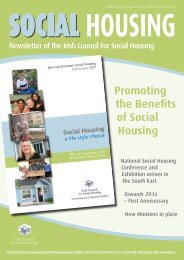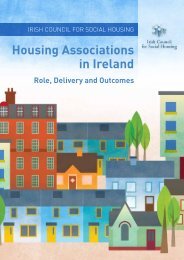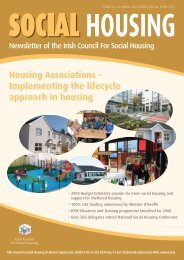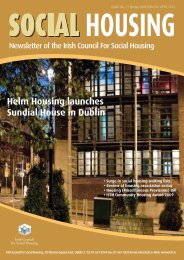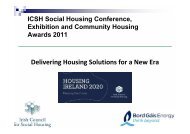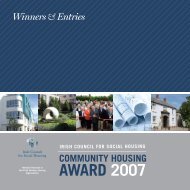National Housing Strategy for People with a Disability 2011 - 2016
National Housing Strategy for People with a Disability 2011 - 2016
National Housing Strategy for People with a Disability 2011 - 2016
You also want an ePaper? Increase the reach of your titles
YUMPU automatically turns print PDFs into web optimized ePapers that Google loves.
Private <strong>Housing</strong>5.34 While many people <strong>with</strong> disabilities own their own homes, <strong>for</strong> others access to homeownership and the private rented market can be curtailed due to income constraints and /or the higher costs of living associated <strong>with</strong> having a disability. The DECLG, in association<strong>with</strong> housing authorities, manage a number of schemes to promote home ownership <strong>for</strong>people <strong>with</strong> lower incomes. These include tenant purchase schemes, incremental purchase,local authority loans and mortgage allowance schemes. In line <strong>with</strong> the Government’s new<strong>Housing</strong> Policy Statement (June <strong>2011</strong>), existing af<strong>for</strong>dable housing programmes are beingstood down to reflect current af<strong>for</strong>dability conditions and will be wound up as part of areview of Part V of the Planning and Development Act 2000.5.35 The DECLG also provides, through local authorities, funding <strong>for</strong> adaptation grants <strong>for</strong>people <strong>with</strong> disabilities and older people to adapt private homes to suit changing needs.Further in<strong>for</strong>mation in relation to the suite of adaptation grants available is contained inChapter 8.Private Rental Sector5.36 As part of a range of actions to address housing need and choice, the Government’s<strong>Housing</strong> Policy Statement (<strong>2011</strong>) recognises that the private rental sector has an importantrole to play in helping to meet accommodation needs. The statement recognises the stepsthat have been taken in recent years to improve the sustainability of the private rentedsector <strong>with</strong> the establishment, via the Residential Tenancies Act, of the Private ResidentialTenancies Board (PRTB) and the creation of real security of tenure, as well as theintroduction and en<strong>for</strong>cement of higher minimum accommodation standards. 25 Thestatement commits to building on this and to making the rented sector a stable andattractive housing option <strong>for</strong> all. It outlines the changes that will take place in this regard,including bringing certain tenancies in the voluntary and cooperative sectors <strong>with</strong>in the remitof the PRTB, addressing the illegal retention of deposits by landlords and the over holding ofproperty by non-rent paying tenants.5.37 The role of the private rented sector in meeting the housing needs of people <strong>with</strong>disabilities was identified as a key area <strong>for</strong> examination in the development of this strategy.A research project, the Potential Role of the Private Rented Sector in the Provision ofAccommodation <strong>for</strong> <strong>People</strong> <strong>with</strong> Disabilities, was undertaken by TrinityHaus Consultants onbehalf of the <strong>Housing</strong> and Sustainable Communities Agency 26 .25The <strong>Housing</strong> (Standards <strong>for</strong> Rented Houses) Regulations 2008 specify requirements in relation to a range ofmatters such as structural repair, absence of damp and rot, sanitary facilities, heating ventilation, natural lightand safety of gas and electrical supply. Other measures, such as increased penalties <strong>for</strong> non-compliance andthe introduction of a more robust sanctions regime were provided <strong>for</strong> in the <strong>Housing</strong> (MiscellaneousProvisions) Act 2009 and came into effect on 1 December 2009.26Eight people <strong>with</strong> disabilities were interviewed during the course of the research project, which wassupplemented <strong>with</strong> interviews <strong>with</strong> stakeholder organisations representing different disability groups. Thefindings were further supplemented by national and international research.58



